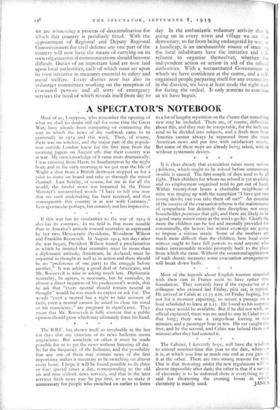. A SPECTATOR'S NOTEBOOK
Most of us, I suppose, who remember the opening of what we shall no doubt still call for some time the Great War, have already been comparing or contrasting the way in which the news of the outbreak came to us personally in 1914 and this week. Then, of course, there was no wireless, and the major part of the population outside London knew for the first time from the morning papers on August 5th. that their country was at war. My own knowledge of it came more dramatically. I was crossing from Havre to Southampton by the night boat; and in the early morning as we got near the Isle of Wight a shot from a British destroyer stopped us for a pilot to come on board and take us through the mined channel. Last Sunday, of course, for me as for all the world, the fateful news was imparted by the Prime Minister's unvarnished words "I have to tell you now that no such undertaking has been received, and that consequently this country is at war with Germany." Less spectacular perhaps, but certainly not less impressive.
If this war has its similarities to the war of 1914 it also has its contrasts. In no field is that more notable than in America's attitude toward neutrality as expressed by her two Democratic Presidents, Woodrow Wilson and Franklin Roosevelt. In August 1914, ten days after the war began, President Wilson issued a proclamation in which he insisted that neutrality must be more than a diplomatic attitude; Americans, he declared, must be impartial in thought as well as in action and there should be no "preference of one party to the struggle before another." It was asking a good deal of Americans, and Mr. Roosevelt is wise in asking much less. Diplomatic neutrality, he agrees, is necessary, but he concedes, in almost a direct negation of his predecessor's words, that he ask that "every neutral should remain neutral in thought" would be too much to expect or ask for. The words "even a neutral has a right to take account of facts; even a neutral cannot be asked to close his mind or his conscience," are pregnant in significance. They mean that Mr. Roosevelt is fully content that a public opinion should grow which may ultimately force his hand.
The B.B.C. has shown itself so invaluable in the last ten days that any criticism of its news bulletins seems ungracious. But somehow or other it must be made possible for us to get the news without listening all day. So far the frequency of the bulletins, and the possibility that any one of them may contain news of the first importance makes it necessary to be switching on almost every hour. I hope it will be found possible to fix three or four special times a day, corresponding to the old six and nine o'clock news services, and that in the later services fresh news may be put first, so as to make it unnecessary for people who switched on earlier to listen to a lot of lengthy repetition on the chance that something new may be included. There are, of course, difficulties about this, and they may be insuperable, for the bulletins tend to be divided into subjects, and a fresh item from America cannot always be separated from the main American news and put first with satisfactory results. But some of these steps are already being taken, with or without systematic design.
It is clear already that evacuation raises many serious r roblems, which ought to be solved before unnecessary trouble is caused. The first couple of days tend to be all right. Then children for whom no school is yet available and no employment organised tend to get out of hand. Within twenty-four hours a charitable neighbour of mine was ringing up with the complaint "I have got two young devils; can you take them off me?" An essential of the success of the evacuation scheme is the maintenance of sympathetic but definitely firm discipline; not every householder possesses that gift, and there are likely to be a good many minor crises as the weeks go by. Clearly the more the children can be fed and mentally provided for communally, the better; but winter evenings are going to impose a serious strain. Some of the mothers are much more difficult than the children; here local committees, ought to have full powers to send anyone who makes unreasonable trouble promptly back to the place from which she came. Without the occasional application of such drastic measures some evacuation arrangements will break down badly.
Most of the legends about English tourists stranded with their cars in France seem to have rather thin foundation. They certainly have if the experience of a colleague who crossed last Friday, plus car, is typical. He arrived at Calais at 11.55 a.m. on Friday hoping, but not for a moment expecting, to secure a passage on a boat scheduled to leave at z.r5. He found to hi g surprise that space would be available. But if he did not wish, an official explained, there was no need to stay in Calais even that long ; there was a cargo-boat leaving in five minutes, and a passenger boat in ten. His car caught the first, and he the second, and Calais was behind them ten minutes after they had entered it.
The Cabinet, I fervently hope, will have the wisdom to extend summer-time this year to the date, whatever it is, at which you lose as much one end as you gain by it at the other. There are two strong reasons for One is that motoring under the new regulations will almost impossible. after dark; the other is that if a saving of electricity is to be enforced there is everything to De said for shortening the evening hours in which electricity is mainly used. JANL






















 Previous page
Previous page